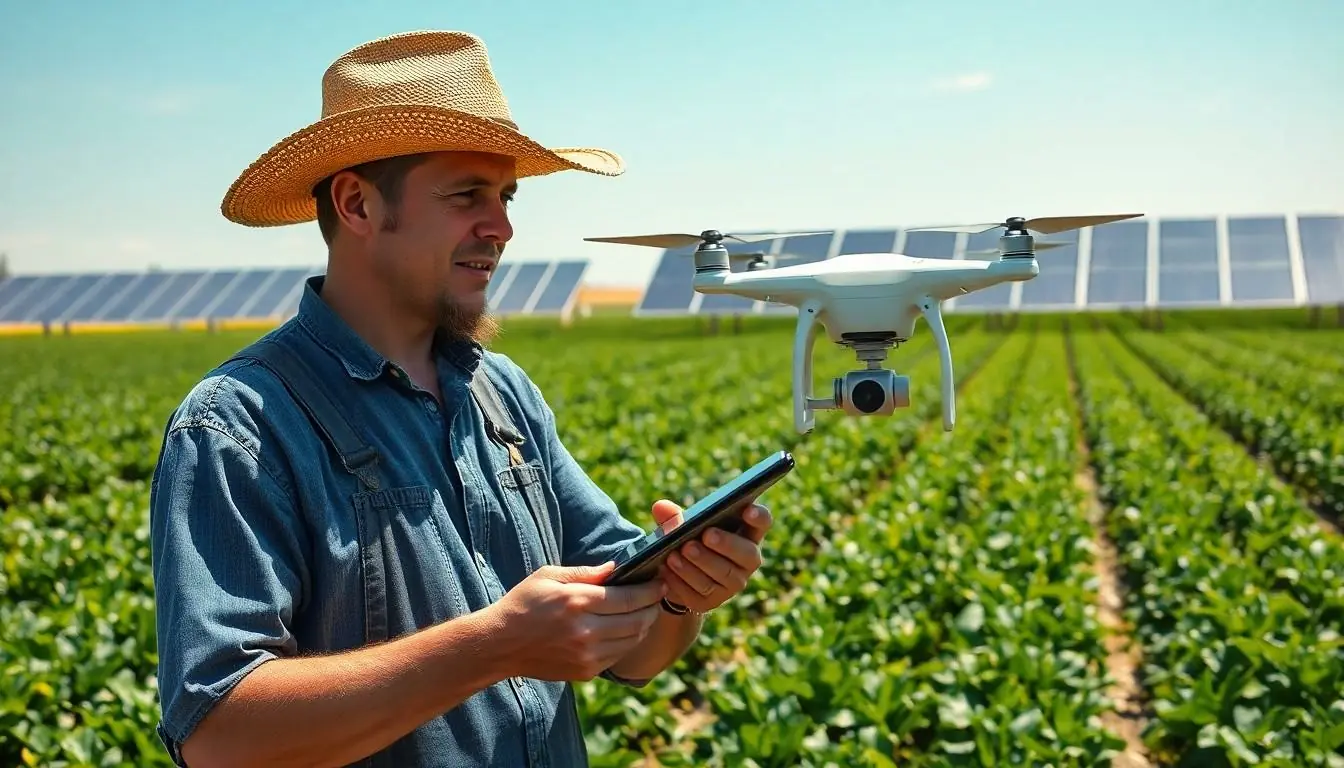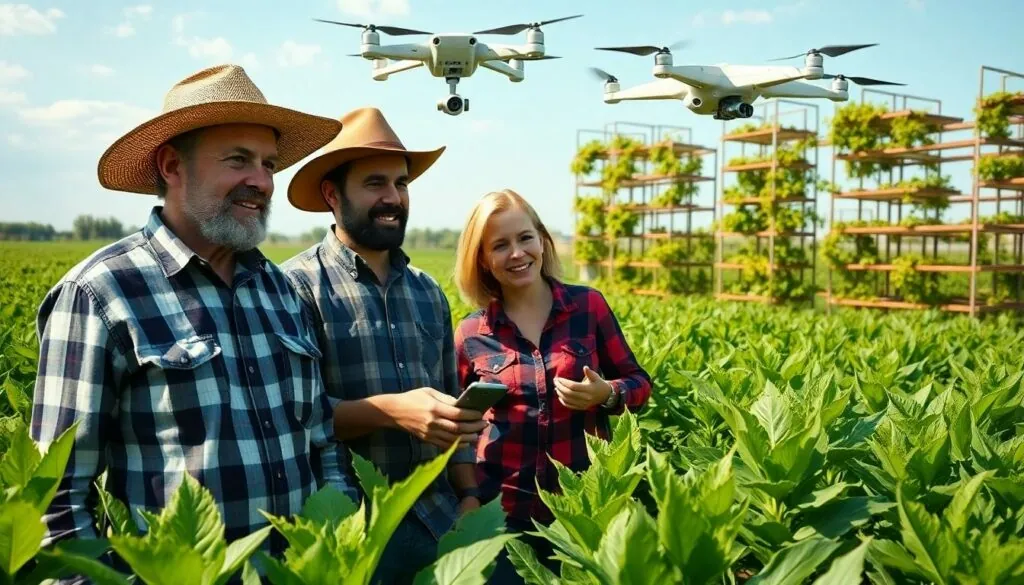Table of Contents
ToggleIn a world where the climate is changing faster than a cat video goes viral, sustainable agriculture technology is stepping up like a superhero in overalls. It’s not just about growing food; it’s about growing it wisely. With innovative tools and practices, farmers are transforming their fields into eco-friendly powerhouses that not only feed the hungry but also nurture the planet.
Overview of Sustainable Agriculture Technology
Sustainable agriculture technology encompasses a range of innovative practices aimed at enhancing food production while minimizing environmental impact. Precision agriculture uses data analytics to optimize crop yields, allowing farmers to apply resources efficiently. Drones contribute to this effort by monitoring crop health and identifying areas needing attention, thus reducing resource waste.
Organic farming technologies focus on natural pest control methods, promoting biodiversity within farming ecosystems. Vertical farming employs innovative growing techniques, allowing for food production in urban areas. Aquaponics combines fish farming with plant cultivation, conserving water and reducing chemical usage.
Soil health monitoring technology detects nutrient levels and soil composition, helping farmers maintain fertility without excessive chemical inputs. Renewable energy sources, like solar panels, power many sustainable farms, reducing reliance on fossil fuels.
Water management systems provide irrigation efficiency, guiding farmers in using just the right amount of water. Additionally, biotechnology advances offer solutions to increase crop resilience against pests and climate variations. These technologies not only address food security concerns but also contribute to the overall health of ecosystems.
Community engagement fosters knowledge sharing, resulting in a collaborative approach to implementing sustainable practices. By adopting these technologies, farmers increase productivity while supporting environmental stewardship.
Benefits of Sustainable Agriculture Technology

Sustainable agriculture technology offers numerous advantages that enhance both the environment and the economy. Farmers increasingly notice these benefits as they implement innovative practices.
Environmental Impact
Sustainable agriculture technology significantly reduces negative environmental effects associated with traditional farming. Innovative methods, such as precision agriculture, decrease the overuse of fertilizers and pesticides, promoting soil health. Adoption of renewable energy integrates solar panels on farms, lowering greenhouse gas emissions. Using drones for crop monitoring enhances resource efficiency and minimizes water usage. Vertical farming practices conserve space and water, making urban food production more eco-friendly. Enhanced biodiversity through organic farming supports a resilient ecosystem. Each of these advancements contributes to a healthier planet, proving that technology and environmental stewardship can coexist.
Economic Benefits
Economic advantages accompany the shift toward sustainable agriculture technology. Increased resource efficiency leads to lower operational costs for farmers. Data analytics in precision agriculture allows for more accurate forecasting of crop yields, reducing waste. Such information ensures better market positioning, often resulting in higher profits. Urban food production methods, like vertical farming, activate local economies by reducing transportation costs. Community engagement fosters collaborations that lead to shared knowledge and reduced expenses. As sustainable practices improve productivity, they create a competitive agricultural sector poised for growth, demonstrating that sustainability and profitability can go hand in hand.
Key Innovations in Sustainable Agriculture Technology
Sustainable agriculture technology continues to evolve, driven by innovation aimed at addressing climate challenges and improving efficiencies. Many advancements are reshaping agricultural practices, particularly in precision agriculture and renewable energy solutions.
Precision Agriculture
Precision agriculture enhances farmers’ ability to monitor and manage crop production meticulously. This technology utilizes data analytics to assess field variability, resulting in optimized input application and improved yield outcomes. Sensors and GPS mapping enable real-time monitoring of crops, allowing for timely interventions. By adjusting water, fertilizer, and pesticide application based on precise needs, farmers can significantly reduce waste. This approach minimizes the environmental impact while maximizing efficiency, leading to sustainable food production. Studies indicate that implementing precision agriculture can increase crop yields by up to 20% while decreasing input costs.
Renewable Energy Solutions
Renewable energy solutions play a critical role in promoting sustainability on farms. Solar panels and wind turbines enable farmers to harness natural energy sources, reducing reliance on fossil fuels. Integrating these technologies not only cuts operational costs but also minimizes greenhouse gas emissions. Farms utilizing renewable energy sources can lower energy expenses by up to 75%, translating to increased profits. Energy-efficient equipment further complements these initiatives, enhancing overall farm productivity. The shift toward renewables strengthens agricultural resilience against climate fluctuation and supports a more sustainable agricultural ecosystem.
Challenges in Implementing Sustainable Agriculture Technology
Implementing sustainable agriculture technology faces several challenges. Economic barriers and technological limitations often hinder widespread adoption.
Economic Barriers
High initial costs pose significant challenges for farmers adopting sustainable technologies. Investing in advanced equipment like drones or precision irrigation systems requires substantial financial resources. Smaller farms, in particular, may struggle with upfront investments, limiting their ability to implement innovative solutions. Additionally, fluctuating market prices for agricultural products can discourage investments in new technologies that promise long-term sustainability. Without adequate financial support or incentives, many farmers may delay or avoid adopting practices that enhance environmental stewardship.
Technological Limitations
Technological limitations present considerable obstacles in the realm of sustainable agriculture. Not all regions have access to high-speed internet, restricting the effectiveness of data-driven technologies such as precision agriculture. Inconsistent availability of machinery and technical support further complicates implementation for many farmers. Moreover, integrating renewable energy sources can pose challenges, especially if local infrastructure isn’t sufficient. Farmers often find that existing technologies may not align with the specific needs of their operations or environmental conditions, affecting overall efficiency and effectiveness.
Future Trends in Sustainable Agriculture Technology
Artificial intelligence (AI) is expected to play a significant role in shaping sustainable agriculture practices. AI can analyze large datasets to provide insights that lead to better crop management and reduced resource use. Robotics will also become more prevalent, automating tasks such as planting, weeding, and harvesting, which can enhance efficiency and lower labor costs.
The adoption of vertical farming solutions is rising, particularly in urban areas. These systems allow for year-round crop production with minimal land usage, addressing food security concerns while conserving resources. Blockchain technology may enhance supply chain transparency, ensuring that products are sourced sustainably.
Sensor technologies are advancing rapidly, enabling real-time monitoring of soil health and crop conditions. Equipped with these tools, farmers can make informed decisions about irrigation and fertilization, resulting in optimized yields. Hydrogels that retain moisture in soil are emerging as a promising solution to conserve water resources in various climates.
Farmers increasingly incorporate renewable energy solutions, like biogas systems, to further reduce their carbon footprint. This integration not only lowers energy costs but also transforms waste into valuable energy sources. Education and training programs are likely to expand, promoting community engagement and successful tech adoption among farmers.
Regenerative agriculture practices are gaining traction as they prioritize the restoration of ecosystems and soil health. Crop rotation and cover cropping techniques, as part of regenerative methods, enhance biodiversity while improving yields. The focus on sustainability aligns with consumer demand for environmentally friendly products, encouraging more farmers to adopt such practices.
Sustainable agriculture technology represents a vital shift in how food is produced while prioritizing environmental health. By embracing innovations like precision agriculture and renewable energy solutions, farmers can enhance productivity and reduce their ecological footprint.
The integration of advanced tools not only optimizes resource use but also fosters resilience against climate change. As challenges persist, ongoing community engagement and education will be crucial in overcoming barriers to adoption.
The future of agriculture lies in these sustainable practices, which promise not just to feed the growing population but also to nurture the planet for generations to come.






